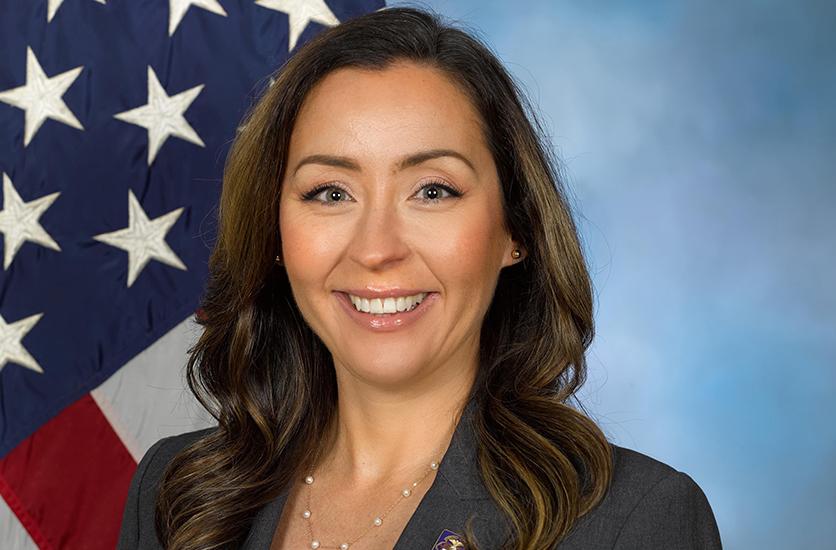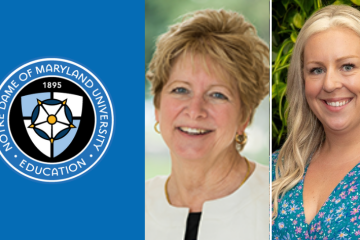NDMU Graduate Rises to Senior Leadership Position in U.S. Army

By: Erik Pedersen, Senior Communications Manager
BALTIMORE – Jessica Brockmeyer ’03, M’15 was first hired by the United States Army as an entry-level chemist after completing her undergraduate studies at Notre Dame of Maryland University, and her career has been on a consistent upward trajectory ever since.
Brockmeyer now serves as Chief of Staff at White Sands Missile Range (WSMR) in New Mexico, where she is the only female member of the leadership team at the largest military test range in the country. In her current role, which she began in March, Brockmeyer is the principal advisor for WSMR’s Commanding General, Executive Director, and Test Center Commander to help ensure successful execution of all missions.
After earning her undergraduate degree in chemistry, Brockmeyer added a master’s in Management and Leadership from NDMU in 2015, which she credits as playing a key role in her steady rise up the U.S. Army’s leadership ranks. Prior to assuming her current position, Brockmeyer served as Operations Chief for the U.S. Army Combat Capabilities Development Command Data & Analysis Center, where she was recognized as the Aberdeen Proving Ground’s Federal Women’s Program Supervisor of the Year in 2021.
Learn more about Brockmeyer’s career progression, her experiences at Notre Dame, and her future professional goals:
How does White Sands Missile Range contribute to the U.S. Army’s overall mission?
WSMR is very unique. We have a longstanding history in the Army and Department of Defense, because we do things that nobody else can do. Our test range is about 100 miles by 40 miles. We can shoot rockets, missiles, long-range systems, and because we have such a long and open range, we can go recover those items and evaluate how they performed, and discover what we might need to do differently. We feed that into the research development and test evaluation communities to make those products better, so that they can ultimately perform as needed.
How has your career progressed to lead you to this point? How did you gain the experience necessary to reach your current position?
I started with the Army as an entry-level chemist. I really enjoyed working in the laboratory, but I soon realized that there is so much more that the Army does, and so much more that I could contribute with the skills that I had. I eventually had the opportunity to do some deployment work focusing on public health. We were identifying and trying to mitigate health exposures that soldiers were seeing when they were deployed in places like Iraq and Afghanistan. I was overseeing all of the projects happening within the U.S. Central Command area.
Later on, I was one of only 50 people selected for the Department of Defense’s Executive Leadership Development Program (ELDP), which allowed me to take a year and learn more about other departments in the organization, and how they interact with other agencies. I was enrolled in my master’s program at Notre Dame at the same time, and it complemented perfectly with what I was doing in the ELDP, because I could put my coursework into action. I was placed into situations where I had to show how I could lead and manage people in unique, complicated and stressful situations, and I was able to tie those two experiences together. It was just a great match.
I was also able to attend the Army’s Command and General Staff College, which is generally just a military leadership college that operational soldiers go to. I was one of 12 civilians that were able to apply. I spent a year in Leavenworth, Kansas, working right beside our military members.
I eventually had the opportunity to become a senior leader. I moved from the Army Medical Command to become an operations director for the Combat Capabilities Development Command. I was independently responsible for everything required to run that organization from an operations standpoint. This was during COVID, which made everything more complicated. Everyone was teleworking, and we were in geographically dispersed areas as well. I was responsible for making sure that we were still able to complete our missions despite those challenges.
My education, my training, and my other experiences all ultimately led to my selection for the Chief of Staff position here at White Sands Missile Range.
How did you first hear about Notre Dame, and what inspired you to enroll here?
I was actually a transfer student as an undergrad. I just felt disconnected at my first school – it was too big. My twin sister was already at Notre Dame, and she kept telling me how great the community was, and how she loved the individualized teaching and small class sizes. She felt so connected to Notre Dame, and to the students and faculty there, and I was not having that experience at my first school. Beginning my sophomore year, I was able to join my sister at Notre Dame.
What was your experience like as a student at Notre Dame?
I felt that my education at Notre Dame and my experience there really provided a sense of self-awareness. Who was I as an individual? What were my strengths, and what were my weaknesses? I think that the transition from high school to college is such an important one, because most people don’t know what they want to do with their lives when they graduate high school. Notre Dame helped me figure that out. I had always been drawn to chemistry ever since I saw the original periodic table, and Notre Dame allowed me to cultivate that. The small class sizes allowed me to really connect with the other students – I could learn from them, and they could learn from me. I also always felt that the faculty was genuinely invested in our success.
What led you to return to school and complete your master’s in Management and Leadership? How did that help your career progression?
Early in my career, I had an opportunity to be on a team to reorganize the organization that I worked for. It was originally a two-star general officer led command, and we were looking to reorganize it based on direction from Congress and our headquarters to become a field operating activity. We were a 3,200-person organization, and I helped move it to a 600- to 700-person organization while taking on all of the responsibilities that were associated with that transition. That detail was actually really impressionable for me, because it helped me see things from a leadership and management perspective for the first time.
That was when I realized that I was going to need higher-level education which focused on leading and managing skills to continue to grow professionally. That led me back to Notre Dame once I noticed that there was a master’s in management and leadership. It seemed like the perfect program for me to take the skills that I learned from this detail and then academically learn about what it means to be a leader, and how I can become a better manager in the future.
Do you take any extra pride in getting to your current position in an organization like the U.S. Army that is still mostly led by men at the highest levels? Have you used your position to help mentor other women who are trying to rise up the ranks?
Absolutely. As a chemistry major, that’s definitely a more male-dominated environment traditionally, and the Army is also typically male-dominated, especially in leadership positions. I take great pride in becoming a senior female leader, to set the example that you can do anything you put your mind to. If you look at our website, it is all males there with me. I am the single female within the command group.
I’ve taken many opportunities to develop and mentor other women. I talk about my career path, my education, and other things that have helped get me where I am, but I also emphasize to them that career progression is not a ladder, it’s a jungle gym. It’s not just a straight upward trajectory. Sometimes you might have to pause and realize, ‘Hey, I have to learn this skill, or I have to cultivate this thing before I can reach the next level.’ Have that self-awareness, know what you need developmentally, and be comfortable in your own skin. If you lead the way that works best for you, it’s going to work well for those that you lead.
What are some of your future career goals?
I have a lot of goals here at White Sands Missile Range. One of those goals is to build stronger relationships across the installation. We have 32 tenants on our installation that my senior commander is responsible for. It’s not just an Army installation, there are 32 other groups doing tests, evaluation, and a variety of activities. I am focusing on ways to better integrate those groups. How can we better communicate across the community, and how can we leverage what each other are doing so that we can all accomplish our missions?
In broader terms, what is the future of national security looking like? What are we going to need to prepare for? What are we going to need to test, and how do we do that as a defense community? I want to be able to help contribute to those discussions. That’s one of my biggest goals while I’m here.
As far as long-term goals, working at WSMR is going to be a great experience for me. I do have future aspirations to become a senior executive within the government. The government has what is called a senior executive service. They are the primary senior leaders of organizations at the enterprise level who are able to lead more strategically, affect national security concerns, things like that. My next step is to prepare myself, do another self-assessment, build my network. I need to attain a couple more mentors and be able to cultivate some skills that I’m going to need to lead at the senior level, but that is my future goal.
Do you have any message for current students as they are working their way through college and trying to figure out the best ways to set themselves up for success?
Get involved as much as possible. Find things that interest you. Take advantage of everything that Notre Dame has to offer, because it will make you a better person and a better communicator.
That’s one of the big things that I’ve had bosses tell me about my liberal arts education. As a chemistry degree holder with a liberal arts background – a B.A. program versus a B.S. – I came with stronger communication skills and a broader perspective compared to the some of the other traditional scientists. I would encourage the students at Notre Dame to leverage that. Get involved in things, learn about yourself, develop skills, and build a network. You will definitely reach back out to the people that you went to college with.
Established in 1895, Notre Dame of Maryland University (NDMU) is a private, Catholic institution in Baltimore, Maryland, with the mission to educate leaders to transform the world. Notre Dame has been named one of the best "Regional Universities North" by U.S. News & World Report.




